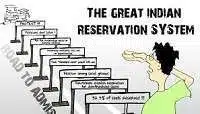
Caste Based Reservation System in India
The spirit of equality prevails in the provisions of the Constitution of India, as the main aim of the founders of the Constitution was to create an egalitarian society wherein social, economic and political justice is prevailed and equality of status and opportunity are made available to all. However, owing to historical and traditional reasons, certain classes of Indian citizens are under severe social and economic disabilities. They cannot effectively enjoy either equality of status or of opportunity.
In ancient India, there was a caste system which existed in Hindu religion. In this caste system, the people were divided into four categories i.e. Brahmin, Kshatriya, Vaishya and Shudra. However, in those times these were not called castes. Instead, these were termed as ‘Varnas’. During the Vedic period, a person’s ‘Varna’ (not ‘caste) was clear by his/ her socio-economic duties. These duties were either performed of one’s own accord or were assigned by the local superintendent and ‘Varna’ was originally not clear by one’s birth into any family.
Nevertheless, over the years, as far as any one of us can remember, caste has been defined by one’s birth. Nobody knows when or where it was decided that the Shudras were the untouchables and did not deserve the respect of society. It is horrifying to read one of the Hindu scriptures says that: “The Shudra must not acquire knowledge and it is a sin and a crime to give him an education. If the Shudra intentionally listens to, for committing to memory, the Veda (Hindu scriptures of knowledge), then his ears should be filled with molten lead; if he utters the Veda, then his tongue should be cut off”.
One can easily imagine the devastating result such thinking must have had on the life of the Shudras. They became outcasts and suffered all atrocities of the so-called upper castes. They were denied the right to make their life comfortable. At the time of independence, the makers of the Constitution had rightly visualised that this deprived section of society needed emancipation through education and employment opportunities. Hence, reservation for the backward classes, scheduled tribes and scheduled castes was essential in order to bring them on par with the others.
It was an attempt to create equality and equity in educational, economic and social areas. There is no doubt that such reservation has actually helped the backward sections of Indian society. It has helped them to come forward, become a part of the mainstream, claim equal rights and opportunities that they had been denied for ages. But over the years, the reservation system seems to have lost its way.
While providing privileges in the Constitution for a limited period of some years, it was felt that the feeling of casteism would vanish. But even after about seven decades of independence, the reservation based on birth in a particular caste continues, and has rather, widened the caste differences. One may ask if a candidate really needs a reservation; in case he belongs to a well-off family and has never in his life experienced any kind of discrimination.
However, a majority of the backward classes are not living any differently than before because their subsistence is meagre and rural lifestyle does not provide them with any of the benefits earmarked for them in the Constitution. The worst thing is that many are not even aware of these policies, especially in the interior parts of the nation. Thus, a distinct economic class system exists within the backward classes.
Mostly, undeserving people have gained the advantages and the deserving ones are still without any significant positive change in their plight. Moreover, the reservation has become an electoral tool nowadays. No doubt, the youth of this nation are against such a blind policy where the benefits are not reaching the right people. However, it is also true that discrimination based on caste is still a part of Indian society.
The policy needs some radical changes. The time has come to identify the sections and more importantly, families of the backward classes that are the ideal and genuine candidates for the reservation system.